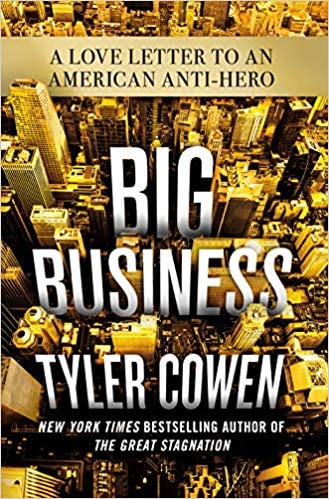You have /5 articles left.
Sign up for a free account or log in.
 Big Business: A Love Letter to an American Anti-Hero by Tyler Cowen
Big Business: A Love Letter to an American Anti-Hero by Tyler Cowen
Published in April of 2019.
What comes to mind when you think of for-profit companies in higher education?
If you are like almost all my higher ed friends, then your answer to my question is likely some variant on "nothing good." Either academics are particularly critical of for-profits in higher education, or I'm hanging out with an unusually skeptical bunch.
I had high hopes that Tyler Cowen's new book, Big Business: A Love Letter to an American Anti-Hero, might help create a wedge for a conversation with my critical-of-for-profit-in-higher-ed friends.
In a somewhat contrarian stance for an academic at a traditional institution, I find myself for-profit curious. The types of for-profit business that intrigue me most are the online program management (OPM) companies. (See Why We Disagree on OPMs, co-written with my research partner Eddie Maloney, to get a flavor of this debate.)
In picking up Cowen's love letter to companies, I thought that I'd have the perfect book to advance my arguments that capitalism can be a force for good in higher education.
Alas, Cowen's enthusiasm about the social utility of the profit motive fails him when it comes to higher education. Cowen writes,
"There is one area where the for-profits appear to be considerably more fraudulent than the nonprofits, and that is higher education. It has become increasingly clear that a lot of educational for-profits charge high fees and encourage students to run up debt without improving the job prospects of those students at all, or perhaps only by a small amount. So you can consider this as one piece of evidence weighing in favor of the honesty of the nonprofits. Still, the overall calculus isn't so simple. Rather than proving to be an indictment of all business practice, these data may suggest simply that for-profit enterprises are ill-suited for that particular sector of education."
Now, of course, Cowen here is not talking about OPMs. He is writing about for-profit universities. Although it would be easy to extend Cowen's logic to for-profit online program management companies, he does not take that step. The big argument against nonprofit schools working with for-profit companies to develop and run online programs is that "for-profit enterprises are ill-suited for that particular sector of education."
If Cowen is so bullish on the advantages of the for-profit sector as a driver of prosperity, productivity and happiness (and his arguments are great), why should higher ed be so different?
Is the strength of Cowen's overall argument weakened by a few sentences of hand waving by way of explanation as to why the logic of capitalism does not apply to higher education?
If corporations are so good for everything else, why should they bad for the production, dissemination and advancement of higher education?
What would happen if Cowen applied his frameworks and tests in which he judged the social efficacy of for-profit companies to the online program management industry?
Beyond Tyton Partners' Trace Urdan, I don't see much of an intellectual case being made for OPMs. Online program management companies are losing to Kevin Carey in the higher ed marketplace of ideas.
Even though Cowen does not extend his analysis to the big for-profit OPM debate that is now going on in higher ed, Big Business could still generate informed discussion on our campuses. Cowen is such an engaging, original and complicated thinker that his ideas are always worthy of thought and conversation.
Cowen has also mastered the art of smart academic conversational writing. We want our scholars and our teachers to be deeply engaged and curious about our world. Academics who are skeptical about the role of business in society may not ultimately have their mind changed by Big Business, but Cowen's book may cause its readers to be a little bit less confident in their beliefs. In today's world of ideological divisions, a little bit of doubt should be considered a very good thing.
Now if we can get Cowen to focus his thinking on the new world of nonprofit/for-profit partnerships in online education!
What are you reading?




